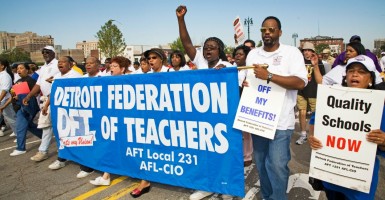After multiple tries, the U.S. Supreme Court will have the opportunity next term to overturn an outdated ruling from a 1977 case, Abood v. Detroit Board of Education.
Previously, the Court ruled against public school teachers who didn’t want to pay dues to a union.
The Supreme Court has recently made clear that government employees cannot be compelled to join a union or to pay for a union’s expressly political activities.
However, these same workers can be charged hefty fees to the union to represent them during collective bargaining negotiations, allegedly in order to avoid a “free rider” problem and to promote “labor peace.”
Many teachers feel that this system amounts to de facto forced union membership and would like the Supreme Court to revisit the issue.
A group of teachers in California who object to paying dues to unions that promote causes that violate their beliefs will have their day before the country’s highest court in Friedrichs vs. California Teachers Association.
The teachers say that, unlike private-sector unions, everything government unions bargain over is a matter of public concern and constitutes an attempt to influence and affect public policy.
They argue that if they have personal objections to the positions being taken by the union, they should not be forced to contribute, and that doing so violates their rights under the First Amendment.
Friedrichs will be one of the closely watched cases before the Supreme Court next term.
The unions contend that in the absence of forced dues, “free riders” would simply enjoy the benefits of union representation without paying for it—degrading the quality of representation overall.
The opposite is true.
In workplaces with compulsory union payments, unions do not have to compete for the support of workers.
In right-to-work states (states where workers must affirmatively opt in to paying dues), unions must convince each worker that their representation is worth the money the worker would pay in dues.
This voluntary dues system leads to competition and increased quality of representation, benefiting both the unions themselves and the workers they claim to represent.
In fact, some union organizers even admit that there are benefits to a system of voluntary dues. For example, Gary Casteel, Southern Regional Director of the United Auto Workers, says:
This is something I’ve never understood, that people think right-to-work hurts unions. To me, it helps them. You don’t have to belong if you don’t want to. So if I go to an organizing drive, I can tell these workers, ‘If you don’t like this arrangement, you don’t have to belong.’ Versus, ‘If we get 50% of you, then all of you have to belong, whether you like to or not.’ I don’t even like the way that sounds, because it’s a voluntary system, and if you don’t think the system’s earning its keep, then you don’t have to pay.
The Washington Post reports that many government unions have responded to the case by ramping up outreach to their members. As one union member put it, “[a] lot of people have lost faith in the union, because they haven’t seen anyone.” Voluntary dues force unions to earn their members’ support instead of taking it for granted.
This case could have wide-ranging implications for the entire nation.
A ruling that affirms the individual public-sector worker’s right to decide how his or her money is spent would essentially make all governmental units in the country right-to-work, because governmental employees would then have to affirmatively opt in before paying union dues.
And there is reason to believe that the Court may rule in Friedrichs’ favor, as Justice Samuel Alito has already written two 5-4 majority opinions indicating that workers cannot be compelled to pay union dues.
In the most recent case, Harris et al. vs. Quinn, Governor of Illinois, et al., Alito wrote that “no person in this country may be compelled to subsidize speech by a third party that he or she does not wish to support.”
It gives government employees hope that the Abood case will finally be overturned and that they may be free to choose how their money is spent.



























